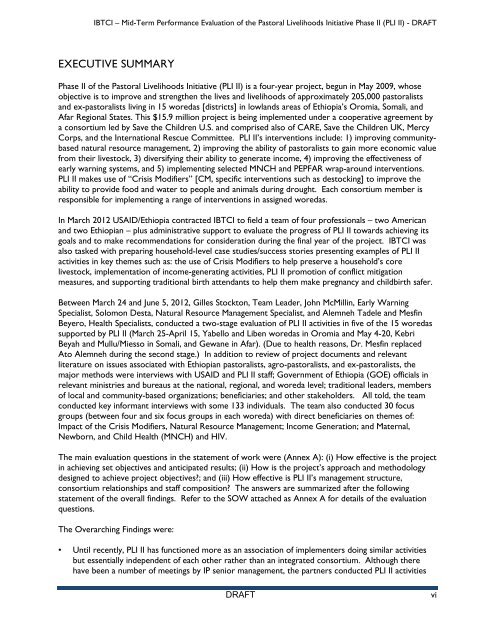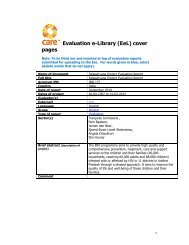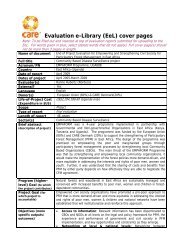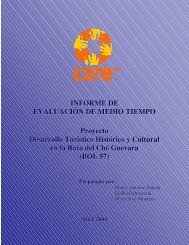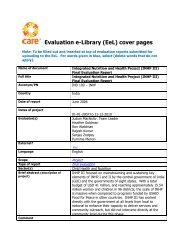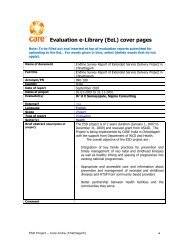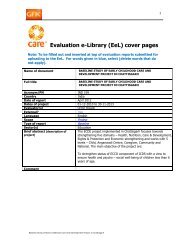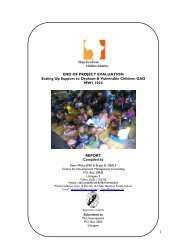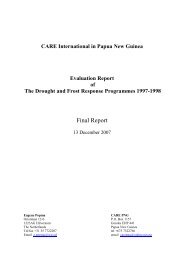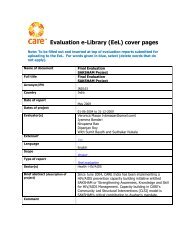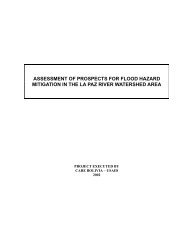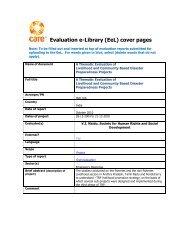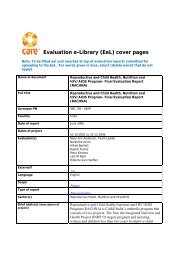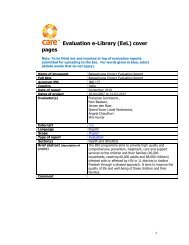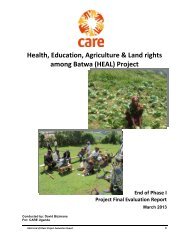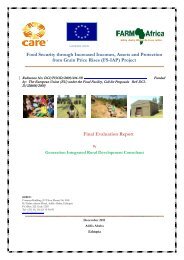Mid Term EVALUATION PLI II project - CARE International's ...
Mid Term EVALUATION PLI II project - CARE International's ...
Mid Term EVALUATION PLI II project - CARE International's ...
Create successful ePaper yourself
Turn your PDF publications into a flip-book with our unique Google optimized e-Paper software.
IBTCI – <strong>Mid</strong>-<strong>Term</strong> Performance Evaluation of the Pastoral Livelihoods Initiative Phase <strong>II</strong> (<strong>PLI</strong> <strong>II</strong>) - DRAFT<br />
EXECUTIVE SUMMARY<br />
Phase <strong>II</strong> of the Pastoral Livelihoods Initiative (<strong>PLI</strong> <strong>II</strong>) is a four-year <strong>project</strong>, begun in May 2009, whose<br />
objective is to improve and strengthen the lives and livelihoods of approximately 205,000 pastoralists<br />
and ex-pastoralists living in 15 woredas [districts] in lowlands areas of Ethiopia’s Oromia, Somali, and<br />
Afar Regional States. This $15.9 million <strong>project</strong> is being implemented under a cooperative agreement by<br />
a consortium led by Save the Children U.S. and comprised also of <strong>CARE</strong>, Save the Children UK, Mercy<br />
Corps, and the International Rescue Committee. <strong>PLI</strong> <strong>II</strong>’s interventions include: 1) improving communitybased<br />
natural resource management, 2) improving the ability of pastoralists to gain more economic value<br />
from their livestock, 3) diversifying their ability to generate income, 4) improving the effectiveness of<br />
early warning systems, and 5) implementing selected MNCH and PEPFAR wrap-around interventions.<br />
<strong>PLI</strong> <strong>II</strong> makes use of “Crisis Modifiers” [CM, specific interventions such as destocking] to improve the<br />
ability to provide food and water to people and animals during drought. Each consortium member is<br />
responsible for implementing a range of interventions in assigned woredas.<br />
In March 2012 USAID/Ethiopia contracted IBTCI to field a team of four professionals – two American<br />
and two Ethiopian – plus administrative support to evaluate the progress of <strong>PLI</strong> <strong>II</strong> towards achieving its<br />
goals and to make recommendations for consideration during the final year of the <strong>project</strong>. IBTCI was<br />
also tasked with preparing household-level case studies/success stories presenting examples of <strong>PLI</strong> <strong>II</strong><br />
activities in key themes such as: the use of Crisis Modifiers to help preserve a household’s core<br />
livestock, implementation of income-generating activities, <strong>PLI</strong> <strong>II</strong> promotion of conflict mitigation<br />
measures, and supporting traditional birth attendants to help them make pregnancy and childbirth safer.<br />
Between March 24 and June 5, 2012, Gilles Stockton, Team Leader, John McMillin, Early Warning<br />
Specialist, Solomon Desta, Natural Resource Management Specialist, and Alemneh Tadele and Mesfin<br />
Beyero, Health Specialists, conducted a two-stage evaluation of <strong>PLI</strong> <strong>II</strong> activities in five of the 15 woredas<br />
supported by <strong>PLI</strong> <strong>II</strong> (March 25-April 15, Yabello and Liben woredas in Oromia and May 4-20, Kebri<br />
Beyah and Mullu/Miesso in Somali, and Gewane in Afar). (Due to health reasons, Dr. Mesfin replaced<br />
Ato Alemneh during the second stage.) In addition to review of <strong>project</strong> documents and relevant<br />
literature on issues associated with Ethiopian pastoralists, agro-pastoralists, and ex-pastoralists, the<br />
major methods were interviews with USAID and <strong>PLI</strong> <strong>II</strong> staff; Government of Ethiopia (GOE) officials in<br />
relevant ministries and bureaus at the national, regional, and woreda level; traditional leaders, members<br />
of local and community-based organizations; beneficiaries; and other stakeholders. All told, the team<br />
conducted key informant interviews with some 133 individuals. The team also conducted 30 focus<br />
groups (between four and six focus groups in each woreda) with direct beneficiaries on themes of:<br />
Impact of the Crisis Modifiers, Natural Resource Management; Income Generation; and Maternal,<br />
Newborn, and Child Health (MNCH) and HIV.<br />
The main evaluation questions in the statement of work were (Annex A): (i) How effective is the <strong>project</strong><br />
in achieving set objectives and anticipated results; (ii) How is the <strong>project</strong>’s approach and methodology<br />
designed to achieve <strong>project</strong> objectives; and (iii) How effective is <strong>PLI</strong> <strong>II</strong>’s management structure,<br />
consortium relationships and staff composition The answers are summarized after the following<br />
statement of the overall findings. Refer to the SOW attached as Annex A for details of the evaluation<br />
questions.<br />
The Overarching Findings were:<br />
• Until recently, <strong>PLI</strong> <strong>II</strong> has functioned more as an association of implementers doing similar activities<br />
but essentially independent of each other rather than an integrated consortium. Although there<br />
have been a number of meetings by IP senior management, the partners conducted <strong>PLI</strong> <strong>II</strong> activities<br />
DRAFT<br />
vi


